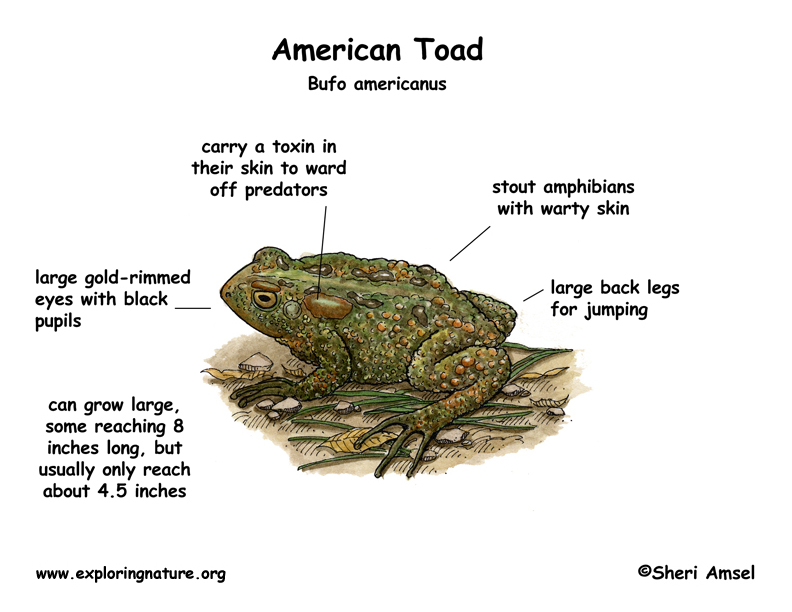

Toads, in general, are found all over the world, except environments that are cold year round and Australia.
They live in many different kinds of habitats. They are found in wetlands, grasslands, forests and farms.
They are stout amphibians with warty skin. Their large “warts” contain glands that secrete a toxin that protects toads from being eaten. There is one large, swollen parotid gland behind each eye. They can grow large, some reaching 8 inches long, but usually only reach about 4.5 inches. They vary in color from tan, brown, gray, olive green, reddish to black. They often have a light stripe down the middle of the back. They have five toes on the their back feet – which are webbed and four toes on their front feet. They have large, dark, gold-rimmed eyes.
They spend their lives on land, only going back to the water to mate and lay eggs. They are active at night (nocturnal).
They eat insects, earthworms and other small animals.
Because of their toxic skin, they have few predators. Humans who handle a toad should wash their hands free of possible toxins afterward.
They mate and lay their strings of eggs in the water. The tadpoles that hatch grow and grow and develop into the adult toads.
Kingdom: Animalia
Phylum: Chordata
Subphylum: Vertebrata
Class: Amphibia
Order: Anura
Family: Bufonidae
Genus: Bufo
Species: B. americanus
When you research information you must cite the reference. Citing for websites is different from citing from books, magazines and periodicals. The style of citing shown here is from the MLA Style Citations (Modern Language Association).
When citing a WEBSITE the general format is as follows.
Author Last Name, First Name(s). "Title: Subtitle of Part of Web Page, if appropriate." Title: Subtitle: Section of Page if appropriate. Sponsoring/Publishing Agency, If Given. Additional significant descriptive information. Date of Electronic Publication or other Date, such as Last Updated. Day Month Year of access < URL >.
Amsel, Sheri. "Toad (American)" Exploring Nature Educational Resource ©2005-2024. December 13, 2024
< http://www.exploringnature.org/db/view/55 >


